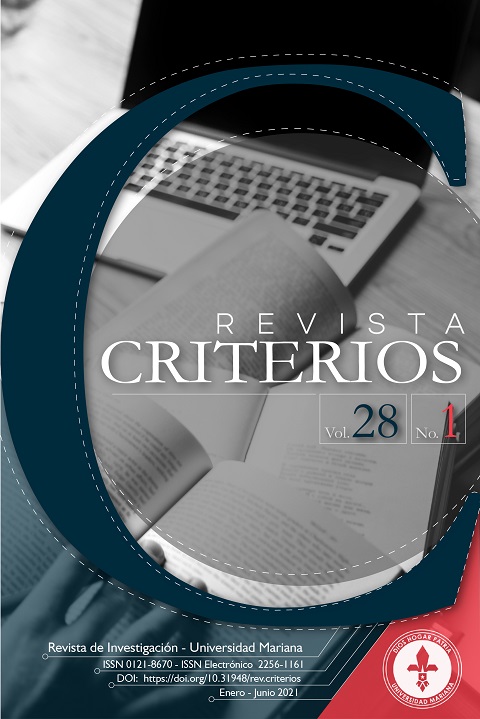Condiciones sociales y psicológicas de los cuidadores familiares de personas con discapacidad
DOI:
https://doi.org/10.31948/rev.criterios/28.1-art3Keywords:
Caregiver, overload, disability, stressAbstract
In order to identify the social and psychological conditions of family caregivers of people with disabilities in Tulcán, Ecuador, as well as the degree of exhaustion and associated factors, this research was carried out with a descriptive, cross-sectional and quantitative design. The analyzed population consisted of 260 caregivers. A general information questionnaire, the Zarit burden scale and the stress response questionnaire were used. The information was collected personally, in a visit to each caregiver, at their home. For the statistical analysis, the SPSS v22.0 program was used. A predominance of women between 56 and 65 years of age was observed; most with a primary level of education. Few received financial remuneration for their work. The most frequent disabilities were physical and intellectual. Most of the caregivers experienced mild overload, although a significant number of these did not experience any type of overload. Most of these had difficulties in their relationship. It was concluded that caregivers have a sociodemographic profile consistent with that described in the specialized literature; levels of overload lower than expected were identified; with great difficulties in various spheres of their daily life, to which it is necessary to provide specialized care and make more visible the role of the caregiver, in the well-being of patients with disabilities.
Author Biographies
Miriam Lucía Villacorte-Méndez, Universidad Politécnica Estatal del Carchi
Magíster en Gerencia en salud para el desarrollo local (Universidad Técnica Particular de Loja). Docente de la Universidad Politécnica Estatal del Carchi.
Mayra Maribel Chapi-Chandi, Universidad Politécnica Estatal del Carchi
Magíster en Enfermería Quirúrgica (Universidad Autónoma de los Andes). Docente de la Universidad
Politécnica Estatal del Carchi.
Blanca Nelly Gordon-Díaz, Universidad Politécnica Estatal del Carchi
Maestría en Gerencia en salud para el desarrollo local (Universidad Técnica Particular de Loja). Docente
de la Universidad Politécnica Estatal del Carchi.
References
Barreto, T.E. (2015). Prevalencia del Síndrome de Cuidador Cansado en cuidadores de pacientes con discapacidad pertenecientes al Programa Joaquín Gallegos Lara en las parroquias de Pifo, Tumbaco y Yaruquí en el periodo: Octubre 2015 a Diciembre 2015 (Tesis de Maestría). Universidad San Francisco de Quito. http://repositorio.usfq.edu.ec/bitstream/23000/5836/1/122634.pdf
Berry, H.G., Disckind, B.B., Reichard, A., & Ruiz, S. (2020). Health characteristics and outcomes of caregivers in the United States: An Analysis of the 2017 Health Information National Trends Survey (HINTS). Disability and Health Journal, 13(1), 10-21. https://doi.org/10.1016/j.dhjo.2019.06.010
Breinbauer, K., Vázquez, H., Mayanz, S., Guerra, C., & Millán, T. (2009). Validación en Chile de la Escala de Sobrecarga del Cuidador de Zarit en sus versiones original y abreviada. Revista Médica de Chile, 137(5), 657-665. https://doi.org/10.4067/S0034-98872009000500009
Cardona, D.A., Segura, Á.M., Berbesí, D.Y. y Agudelo, M.A. (2013). Prevalencia y factores asociados al síndrome de sobrecarga del cuidador primario de ancianos. Revista Facultad Nacional de Salud Pública, 31(1), 30-39.
Centers for Disease, Control, and Prevention. (2010). Disability and Health Overview. https://www.cdc.gov/ncbddd/disabilityandhealth/disability.html
Consejo Nacional para la Igualdad de Discapacidades. (2020). Estadísticas de discapacidad. https://www.consejodiscapacidades.gob.ec/estadisticas-de-discapacidad/
De Valle-Alonso, M.J., Hernández-López, I.E., Zúñiga-Vargas, M.L. y Martínez-Aguilera, P. (2015). Sobrecarga y burnout en cuidadores informales del adulto mayor. Enfermería Universitaria, 12(1), 19-27. https://doi.org/10.1016/j.reu.2015.05.004
Fernandes, C.S., & Angelo, M. (2016). Family caregivers: what do they need? An integrative review. Revista da Escola de Enfermagem da USP, 50(4), 672-678. https://doi.org/10.1590/S0080-623420160000500019
Ghazawy, E.R., Mohammed, E.S., Mahfouz, E.M., & Abdelrehim, M.G. (2020). Determinants of caregiver burden of persons with disabilities in a rural district in Egypt. BMC Public Health, 20(1), 1156-1160. https://doi.org/10.1186/s12889-020-09266-4
Guedes, A.C., & Pereira, M.G. (2013). Burden, coping, physical symptoms and psychological morbidity in caregivers of functionally dependent family members. Revista Latino-Americana de Enfermagem, 21(4), 935-940. https://doi.org/10.1590/S0104-11692013000400015
Members of the EPA Executive Committee, Galderisi, S., Gorwood, P., Gaebel, W., Kurimay, T., Dom, G., Beezhold, J., Wasserman, D., Bailey, S., Hanon, C., Heinz, A., Sartorius, N., van der Gaag, R. J., Vavrusova, L., & Wise, J. (2018). United Nations convention on the rights of persons with disabilities needs to be interpreted on the basis of scientific evidence regarding psychiatry. European Psychiatry, 51(6), 87-89. https://doi.org/10.1016/j.eurpsy.2018.05.008
Ministerio de Inclusión Económica y Social (MIES). (2014). Informe de Gestión 2012-2013. https://www.inclusion.gob.ec/publicaciones-mies/
Organización Mundial de la Salud (OMS). (s.f.). Discapacidades. https://www.who.int/topics/disabilities/es/
Ramírez, C. y Luna, H. (2018). La cuidadora de personas discapacitadas en Ecuador. El caso de las beneficiarias del Bono Joaquín Gallegos Lara. Universidad y Sociedad, 10(3), 78-84.
Salazar-Maya, A.M., Cardozo García, Y. y Escobar, C.L. (2020). Carga de cuidado de los cuidadores familiares y nivel de dependencia de su familiar. Investigación en Enfermería: Imagen y Desarrollo, 22(5), 45–56. https://doi.org/10.11144/Javeriana.ie22.cccf
Toledano, F., & Domínguez, M.T. (2019a). Psychosocial factors related with caregiver burden among families of children with chronic conditions. BioPsychoSocial Medicine, 13(1), 6-14. https://doi.org/10.1186/s13030-019-0147-2
Toledano, F., Rodríguez-Rey, R., Moral, J., & Luna, D. (2019b). A Sociodemographic variables questionnaire (Q-SV) for research on family caregivers of children with chronic disease. BMC Psychology, 7(1), 85-94. https://doi.org/10.1186/s40359-019-0350-8
Urbina, M. y Zapata, G. (2017). Síndrome de sobrecarga del cuidador y su relación con el cuidado de personas con discapacidad grave y muy grave, registrados en el centro de salud No 2 ‘Las Casas’, perteneciente al distrito 17D05 en la ciudad de Quito, 2016 (Trabajo de Especialización). Pontificia Universidad Católica del Ecuador. http://repositorio.puce.edu.ec/bitstream/handle/22000/12982/TESISDRAS.ZAPATAYURBINA.pdf?sequence=1
Wilkins, V.M., Sirey, J.A., & Bruce, M.L. (2020). Caregiver reward and burden: differing constructs in family members providing care for medically ill homebound older adults. Journal of Aging and Health, 32(5–6), 361–370. https://doi.org/10.1177/0898264319825760
World Health Organization. (2018). International Classification of Functioning, Disability and Health (ICF). https://www.who.int/classifications/international-classification-of-functioning-disability-and-health
How to Cite
Downloads
Downloads
Published
Issue
Section
License

This work is licensed under a Creative Commons Attribution 4.0 International License.
Revista Criterios es publicada por la Editorial UNIMAR de la Universidad Mariana bajo los términos de la licencia Creative Commons Reconocimiento 4.0 Internacional (CC BY 4.0)

| Article metrics | |
|---|---|
| Abstract views | |
| Galley vies | |
| PDF Views | |
| HTML views | |
| Other views | |








